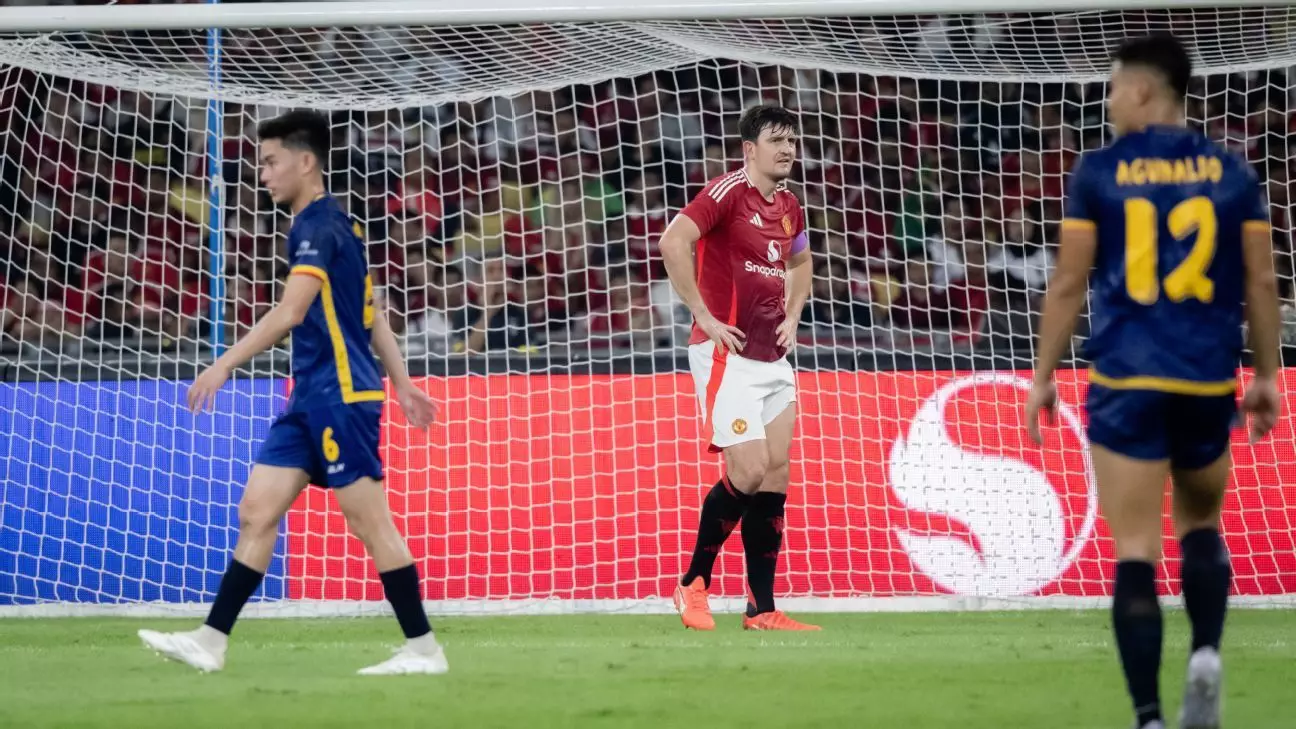Manchester United’s journey through an agonizing season hit another low note this week when they faced the ASEAN All-Stars in Kuala Lumpur, suffering a 1-0 defeat that saw the home crowd express their displeasure vocally at the final whistle. This exhibition match was supposed to offer some respite after a genuinely troubling domestic campaign, yet it ended up underlining the team’s continued struggle, both on and off the field. A lack of cohesion and skill was apparent, echoing the same issues that plagued United during their disheartening 15th place finish in the Premier League this season.
The match occurred shortly after United’s final game of the league against Aston Villa, where they recorded a 2-0 victory at Old Trafford, yet even that win couldn’t mask the dire reality facing them. The staggering drop in their standings is but a reflection of a club that has lost its identity and competitive edge. The goal scored against them by Maung Maung Lwin, a relatively lesser-known player from Thai League 1, highlighted the disarray within United’s ranks, raising questions about their recruitment and development strategies.
Unyielding Pressure on Amorim
The atmosphere around the club is thick with pressure, which was painfully evident in the post-match remarks of manager Ruben Amorim. Expressing a sense of guilt over the underwhelming performances, he stated, “I feel always guilty… since I’m here for the first day, I am guilty.” This level of introspection is commendable, but it also points to a deeper issue: the management and coaching staff must urgently address their tactics and the players’ execution on the pitch. The boos from the fans are not merely isolated experiences; they are an indictment of the club’s recent failures and a demand for accountability.
What stands out is Amorim’s acknowledgement of the fans’ right to express frustration. “Every game we lost in the Premier League, they were always there,” he lamented. This connection between fans and team performance is vital in football; supporters invest emotional energy that deserves reciprocation in terms of effort and ambition on the field. Amorim’s admission, while honest, underlines a gravity that suggests an urgent need for improvement—not just by the team but by the managerial infrastructure that surrounds it.
Strategic Changes Needed for a Bright Future
The mention of squad changes and future strategies by the club’s CEO Omar Berrada hints at a glimmer of hope albeit in an environment rife with uncertainty. He stated, “We have been planning for many months now” and stressed that there’s a clear vision for strengthening the team. Such declarations are encouraging, yet they must convert into actionable movements during the transfer window. The enigmatic connection to Matheus Cunha, a forward at Wolverhampton Wanderers, raises eyebrows—can the club secure talents who have the potential to reignite their path to prominence in the Premier League?
However, to base next season’s expectations on potential signings alone would be a superficial approach. Existing players must vastly improve their performances, and Amorim needs to foster a mentality of winning and resilience. The aging and underperforming stars such as Harry Maguire, who is still transitioning under the new managerial philosophy, must either adjust to fulfill roles effectively or gracefully step aside for fresher talent.
The Need for Identity Restoration
Every major club has its tumultuous seasons, yet Manchester United’s scale of decline makes one question if they can restore their long-lost identity. The upcoming fixture against the Hong Kong national team presents an opportunity to correct course before the squad disperses for summer break. This match must serve as a crucial assessment for Amorim and the club—can they take steps toward revitalizing a squad that has faced ridicule, not just from their own supporters, but from the football community worldwide?
Moving forward, it is imperative for Manchester United to rediscover their philosophy that has long since faded. Achieving a strong sense of unity among players—grounded in ambition and skill—will determine if they can rise above the wreckage of this season. Failure to acknowledge the urgency of their plight may further alienate fans while dooming any chances of future success. The banners hung high in the stands may represent hope now, but they could easily morph into symbols of disillusionment if the tide does not turn soon.

